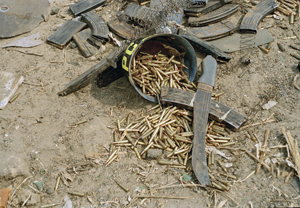The Mandate and Role of the Office
Background

Machetes and bullets near the border in Gisenyi, Rwanda.
(26 July 1994, UN Photo/John Isaac)
The tragedies of Rwanda and the Balkans in the 1990s demonstrated, in the worst possible way, that the United Nations had to do more to prevent genocide. With this in mind, in 2001 the UN Security Council invited the Secretary-General “to refer to the Council information and analyses within the United Nations system on cases of serious violations of international law” and on “potential conflict situations” arising from “ethnic, religious and territorial disputes” and other related issues. In consideration of the Council’s request, in 2004 the Secretary-General appointed the first Special Adviser on the Prevention of Genocide, Juan Méndez. In 2007, the Secretary-General appointed Francis Deng as his Special Adviser on the Prevention of Genocide, on a full-time basis and at the level of Under-Secretary-General. On 17 July 2012, Secretary-General Ban Ki-moon appointed Adama Dieng of Senegal as his Special Adviser on the Prevention of Genocide.
In 2008, the Secretary-General appointed Edward Luck as his Special Adviser on the Responsibility to Protect, on a part-time basis and at the level of Assistant Secretary-General. The Special Adviser on the Responsibility to Protect is responsible for the further development and refinement of the concept. He is also charged with continuing a political dialogue with Member States and other stakeholders on further steps toward implementation.
The two Special Advisers have distinct but closely related responsibilities. In order to save resources and maximise effectiveness, the Secretary-General institutionalized the collaboration between the Special Advisers. As far as possible, the two Advisors share a common methodology for early warning, assessment, convening, learning, and advocacy, as well as a common office and staff.